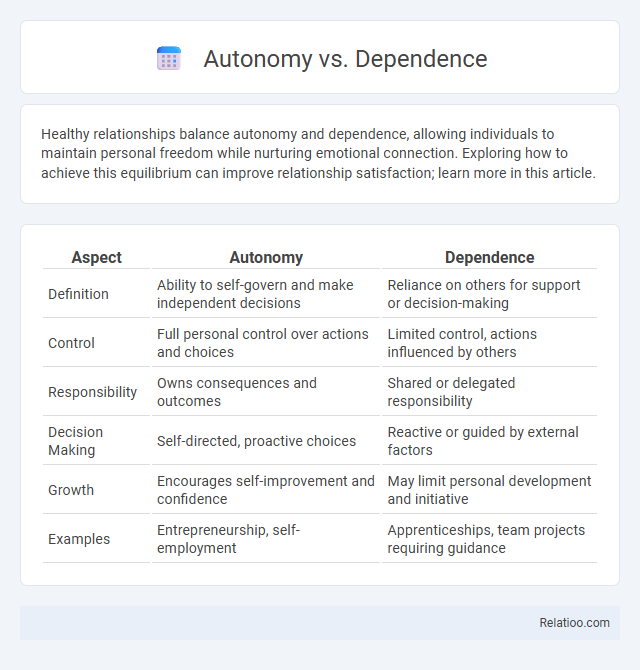Healthy relationships balance autonomy and dependence, allowing individuals to maintain personal freedom while nurturing emotional connection. Exploring how to achieve this equilibrium can improve relationship satisfaction; learn more in this article.
Table of Comparison
| Aspect | Autonomy | Dependence |
|---|---|---|
| Definition | Ability to self-govern and make independent decisions | Reliance on others for support or decision-making |
| Control | Full personal control over actions and choices | Limited control, actions influenced by others |
| Responsibility | Owns consequences and outcomes | Shared or delegated responsibility |
| Decision Making | Self-directed, proactive choices | Reactive or guided by external factors |
| Growth | Encourages self-improvement and confidence | May limit personal development and initiative |
| Examples | Entrepreneurship, self-employment | Apprenticeships, team projects requiring guidance |
Understanding Autonomy and Dependence
Understanding autonomy involves recognizing your ability to make independent decisions and take control of your life without excessive reliance on others. Dependence, in contrast, occurs when your actions and choices are heavily influenced or dictated by external factors or people, limiting personal freedom and growth. Balancing autonomy and dependence is essential for developing self-reliance, which empowers you to navigate life's challenges confidently while knowing when to seek support.
Historical Perspectives on Autonomy vs Dependence
Historical perspectives on autonomy versus dependence reveal a complex evolution shaped by political, social, and economic forces. Colonial eras prominently featured dependence as indigenous populations were subjugated under imperial powers, contrasting with emerging nationalist movements that emphasized self-reliance and political autonomy. Philosophers like John Locke and Jean-Jacques Rousseau contributed foundational ideas about individual autonomy, influencing modern concepts of self-governance and independence.
Psychological Foundations of Autonomy
Psychological foundations of autonomy emphasize the development of self-regulation, intrinsic motivation, and personal agency, which enable individuals to make decisions aligned with their values and goals. Autonomy contrasts with dependence, where behavior is controlled by external forces, and with self-reliance, which highlights confidence in one's abilities but may overlook social interconnectedness. Understanding autonomy within psychological frameworks involves exploring how individuals balance internal drive and social influences to achieve adaptive functioning and well-being.
The Role of Dependence in Human Relationships
Dependence plays a crucial role in human relationships by fostering trust, emotional support, and mutual care, which are essential for psychological well-being. It enables individuals to share vulnerabilities, building stronger interpersonal bonds and facilitating collaborative problem-solving. While autonomy promotes independence, balanced dependence ensures connectedness and resilience within social networks.
Autonomy in Personal Development
Autonomy in personal development empowers you to make independent decisions, fostering confidence and resilience. Cultivating autonomy enhances your ability to manage challenges without relying excessively on others, promoting long-term growth. Embracing self-direction propels you toward achieving goals with a stronger sense of purpose and personal accountability.
Dependence in Social and Cultural Contexts
Dependence in social and cultural contexts often shapes individuals' behavior and decision-making through established norms, family ties, and community support systems that emphasize interconnection over individual autonomy. Your reliance on social networks and cultural traditions provides essential emotional and practical resources but may also limit personal freedom and independence when conformity to group expectations is prioritized. Understanding this balance is crucial for navigating the dynamics between autonomy, dependence, and self-reliance within diverse cultural frameworks.
The Balance Between Autonomy and Dependence
Achieving the balance between autonomy and dependence involves recognizing when self-reliance fosters personal growth and when seeking support enhances resilience. Autonomy empowers individuals to make decisions based on internal values, while dependence can provide essential resources and emotional support during challenges. Optimal functioning occurs when self-reliance is complemented by strategic interdependence, promoting well-being and adaptive problem-solving skills.
Impact of Technology on Autonomy and Dependence
Advancements in technology have significantly reshaped the balance between autonomy, dependence, and self-reliance by enabling individuals to perform complex tasks independently through tools like artificial intelligence and smart devices. Access to digital platforms and automation reduces reliance on external support systems, fostering greater personal autonomy and decision-making capabilities. However, increased dependence on technology also raises concerns about potential vulnerabilities when systems fail, highlighting the need for maintaining core self-reliance skills amid growing digital integration.
Fostering Healthy Autonomy Without Neglecting Support
Fostering healthy autonomy requires balancing individual self-reliance with appropriate support systems, enabling personal growth while ensuring access to guidance when needed. Encouraging decision-making skills and self-confidence promotes independence, but maintaining emotional and social support prevents isolation and dependence. Effective approaches integrate empowerment with empathy, cultivating resilience and well-being in diverse life contexts.
Navigating Autonomy and Dependence in Modern Society
Navigating autonomy and dependence in modern society requires balancing personal independence with the practical need for support networks. Your ability to develop self-reliance enhances decision-making and resilience while recognizing when to seek help fosters collaboration and growth. This equilibrium is essential for thriving in complex social and professional environments.

Infographic: Autonomy vs Dependence
 relatioo.com
relatioo.com